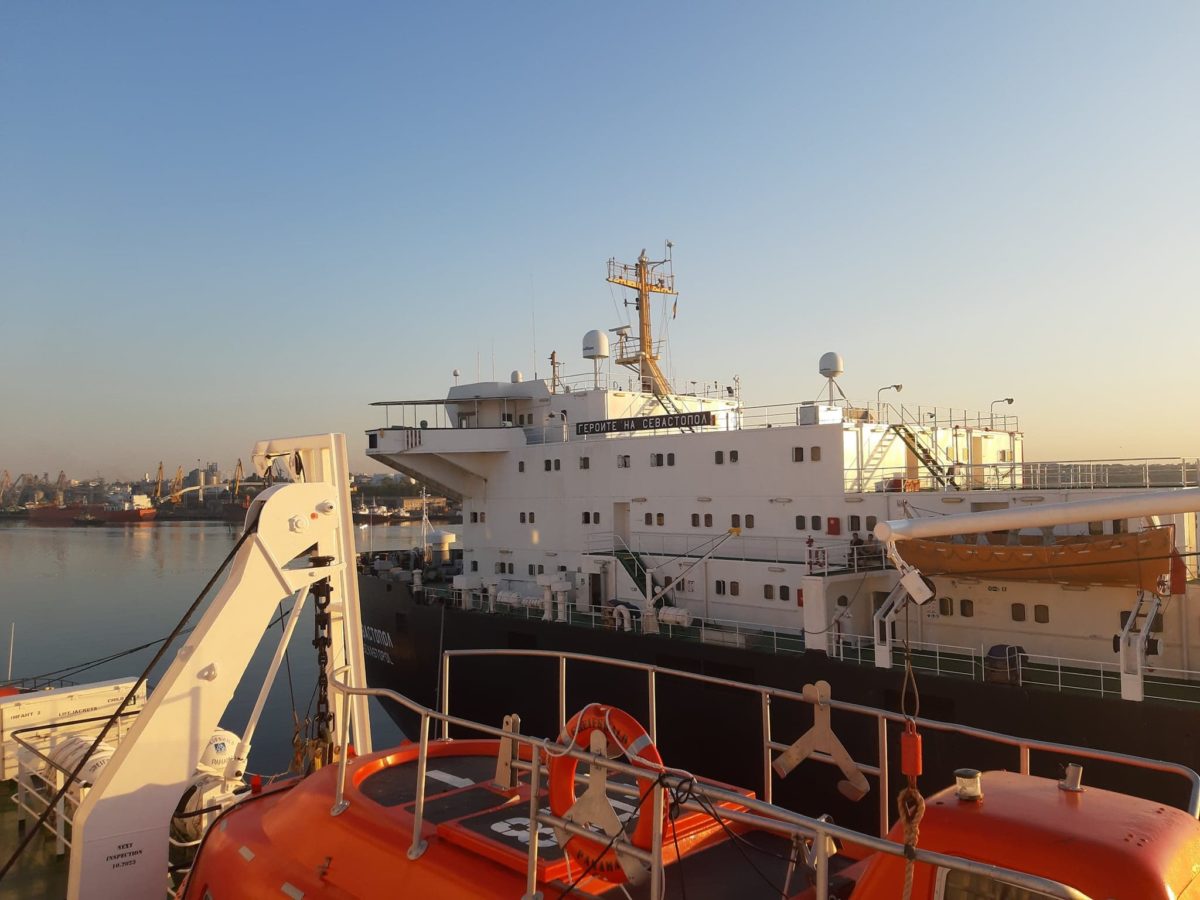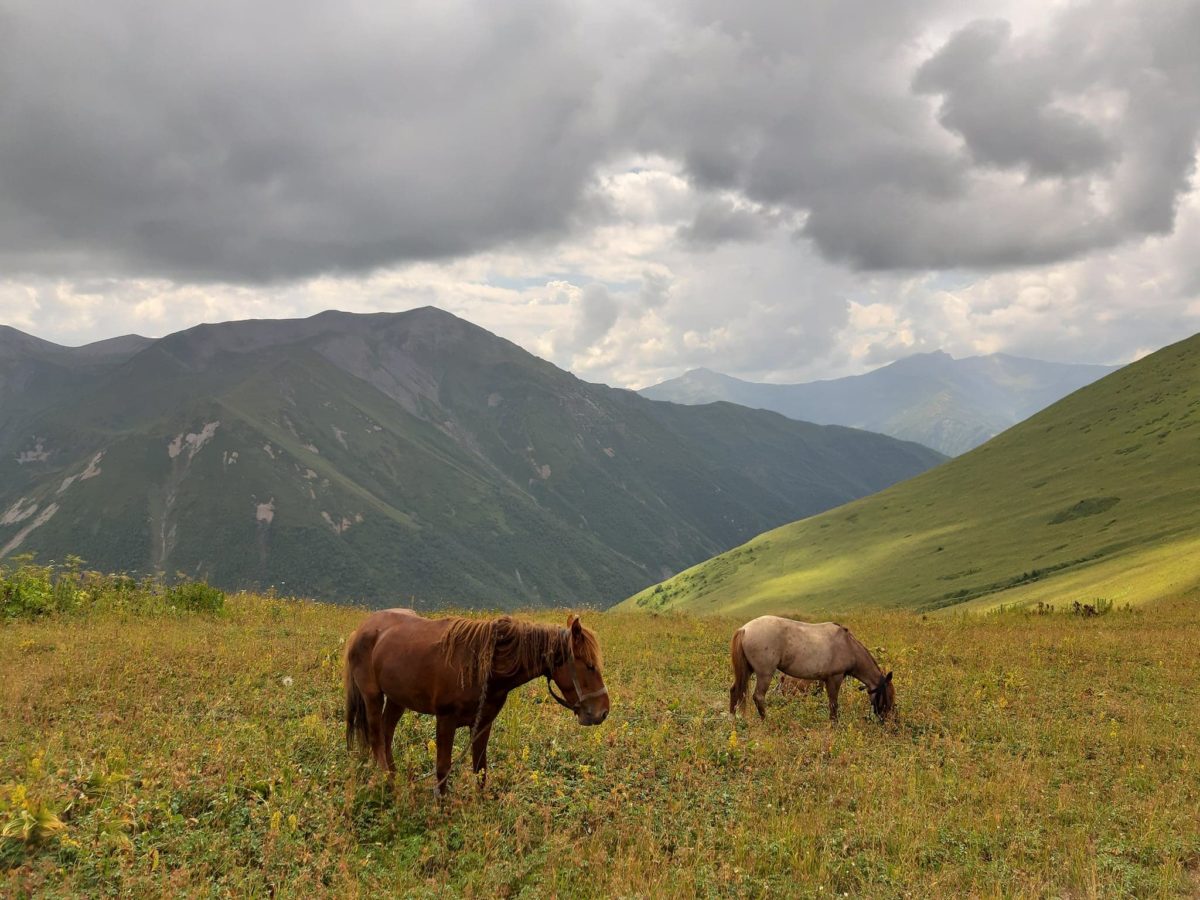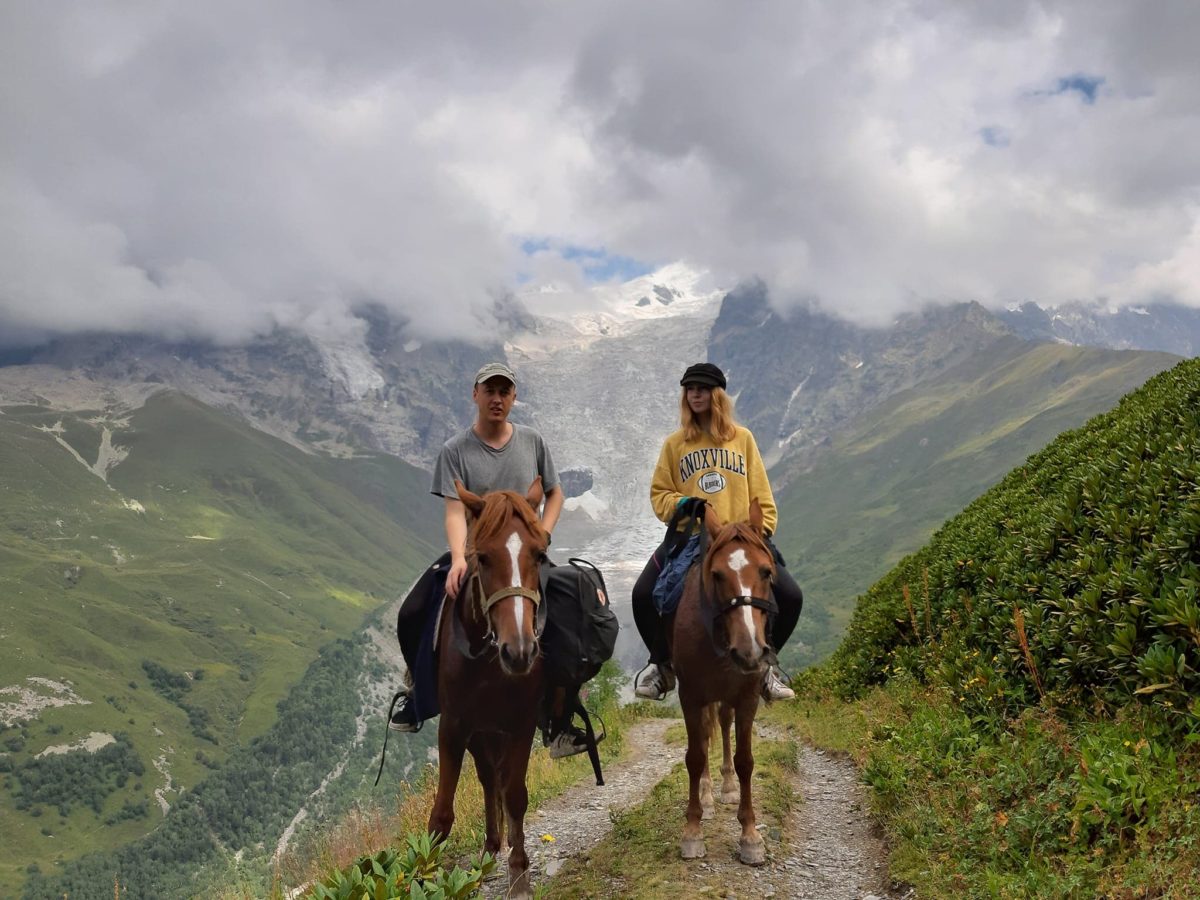By : Maia Hörstadius
“Where do you want to go?” Gustav asked me. We sat on the floor in my brother’s house, in front of an enormous world map. I closed my eyes and put a finger down randomly.
“Ah, Georgia!” Gustav said. I opened my eyes. It was not Georgia the U.S. state. It was the small, post-Soviet country of Georgia by the Black Sea, neighboring Russia, Azerbaijan, Armenia and Turkey; a Eurasian country in the Caucasus region, famous for its red wine.
“So, how do we get there?” I wondered. We decided to go by ferry from Ukraine. Why fly, when you can cross the Black Sea in two days on a cargo ship? We booked a flight to Odessa, Ukraine, and tickets for a ferry named Greifswald.
I didn’t mind going to Odessa for a few days. Last year, we fell in love with the place. Especially the fact that you could play games (soft air gun, for instance) and have drinks at the same spot. The combination of soft air guns and alcohol would not be highly appreciated in Sweden, my country, but yet – there is something about it, a sense of freedom.
“Taste this”, a young waiter said to us one evening, as he was pouring suspiciously muddy liquids into five small glasses on the table. It was a nice restaurant close by Hrets’ka Square. We weren’t hungry because of the heat, so we had just ordered samples of their homemade vodka. It came in six different flavors, and they all looked like dishwater. The waiter smiled as we made faces and tried not to vomit
“I usually have thirty glasses a day. Ten glasses before work and twenty afterwards”, he said, and went on with his business.
We spent the last days in Odessa riding scooters, and ended up being lost on a remote dirt road far outside the city. It was a bumpy ride, our faces covered in dust. Then, suddenly, the small road that had taken us through villages and fields merged with a heavily trafficked highway.
Luckily, Gustav is a great map-reader. He looks at a map once, and remember the whole thing by heart. He examined our map for a few seconds, and pointed out a place by the ocean: Arcadia beach.
“Let’s do it,” I said, and we continued forward, trying not to die in front of a truck.
Arcadia was a strange place. The water wasn’t blue, as in the pictures – it was poisonous green by algae contamination. Otherwise, it was like most other beach resorts: stores, restaurants, a crowded but shabby beach. We mounted our scooters again and set off towards Odessa, to have a last couple of beers before re-packing our backpacks. The next day, we were bound for the Black Sea.

Greifswald turned out to be a massive ship. As we were about to embark, we heard a loud rustling noise from behind.
“What…” I began. I was drowned out by a passing train wagon. It was the first of many. I looked down, and realized I was standing on a railroad track.
Some hours later, the crew allowed passengers onboard. We had to sneak in through the lower deck, nestle ourselves between trucks and wagons, to finally reach an elevator. The elevator did not start. Not until a determined babushka gave the door a good kick and used some violence on the “UP”-button.
The tired reception lady assigned us a cabin. It had a small window, where you could see the upper deck and the ocean beyond. It also had a primitive bathroom and a bunk bed – kind of luxurious for being a cargo ship.
Dinner was served at eight o’clock. We ended up at the same table as an Ukrainian family with three children. We did not understand them and they did not understand us, so we ate in silence; sausage with mashed potatoes and peas. I asked for a vegetarian substitute. Reception lady plucked the sausage from my plate with a grin, no replacement offered. Cargo ships are no place for privileged treatment.
After dinner, the few families onboard went back to their cabins, leaving only us and twenty truck-drivers. There was a little bar, open until midnight. Sweaty, red-faced men in grey tank tops and sweatpants gathered around it. The bartender looked like a vampire; black hair, reddish eyes and pale face. He took orders quietly, not uttering a single word.
“Can we get two cappuccinos?” Gustav asked. The man’s face changed; he was used to serve beer cans from the fridge. Easy. Now, we asked him to do a freaking cappuccino. He started to rattle with the coffee machine, muttering something inaudible.
At the same time, two truck-drivers began to quarrel. What started as an argument soon escalated to a fist fight. The bartender smiled cunningly. A third truck-driver came to separate the two, screaming at them in Russian. Russian is a powerful language; it makes everything sound more brutal, more dramatic.
We arrived at Batumi, Georgia’s second biggest city, almost in time – only half a day behind schedule. It was almost midnight when we finally got off the ship. The truck-drivers, looking more worn than rested, entered their vehicles and drove off into the night. We located a cheap hotel and decided to get some sleep.
The next morning we headed towards Mestia, a mountain village. Travels to Mestia are arranged by private mini-bus drivers; the buses are called marshrutkas, and they’re hell on wheels. Most of them have no air conditioning. They don’t depart at fixed times – the driver usually waits until the marshrutka is full. Namely, when it’s so crammed that no one can breathe or move. I had an Israeli man on my lap. Gustav lost blood flow in his legs. It took about ten hours from Batumi to Mestia, including a transfer in Zugdidi.
Mestia was a picturesque, happy place. It’s where hikers come together after miles and miles of trekking in the wilderness, where journeys start with anticipation; the last comfortable outpost. We went into a tourist office and asked for advice.
“This route takes about four days,” said the friendly woman behind the desk, following a marked trail on the map with her finger. “Mestia to Ushguli.”
“Is it possible to rent horses?” we asked her.
“I can check with horse owners nearby,” she replied, and made a quick phone call. “Yes, that is possible. They have two horses available. The guide can pick you up tomorrow.”
“Um… do we really need a guide?” Gustav and I glanced at each other. He can read a map, I am good with horses. We were looking forward to a solitary adventure, not restricted by any third parties.
“Unfortunately it’s illegal to ride without a guide in the mountains”, the woman said, smiling apologetically.

So it was. The guide – we came to call him Mr. DJ, and I will later explain why – showed up outside our hotel in early morning. He had three ponies with him. They looked way too small for us. I tried telling Mr. DJ of my worries, but he did not speak English. He just mounted his horse, a chestnut mare, and gesticulated that we should do the same.
“I’m sorry,” I whispered to my pony. He was the smallest of the three, and didn’t look like a guy who likes his job. I decided to call him Ferret; he was tiny, with speckled coat and big sad eyes.
As we left the village, following an ascending path surrounded by small streams and trees, I catched a glimpse of the mighty mountains rising behind the forest line. I also sensed that Ferret was softening up a little; somewhere around this time, we became friends.
Mr. DJ had brought a big, loud speaker, on which he played either cliché love songs or French techno. It disrupted the peace of nature. Ferret’s reason for disliking him was somewhat different; every time the little pony slowed down, Mr. DJ spanked his ass from behind with a wooden stick. I told him to stop, but he didn’t, so we tried a different tactic – we slowed down to the extent that Mr. DJ stopped caring about us. He was a man of efficiency, a man of speed; I reckon that he wanted to spend as little time as possible on the trail with us.
Once in a while, the path became steep and unreliable. I dismounted Ferret and walked by his side. The sad eyes were back, I felt horrible. “I know, I know”, I said to him, caressing his soft muzzle, feeding him an apple that I brought from Mestia. It was easy to bribe him; he immediately recovered from his sadness, starting to search for additional treats in my pockets.
By afternoon we reached Tsvirmi, a mountain village where most hikers stay the first night. We released the horses on a green field next to our guest house. Our hosts were occupied by unloading hay into a barn, preparing for winter. I grabbed a pitchfork and started to help them. They giggled. Gustav was reading a book on the porch. When evening came, the mother of the house cooked for us; traditional Georgian food, a spicy eggplant dish served with cheese flatbread. Mr. DJ sat on a couch in the living room, occupied with his phone, probably preparing a playlist for next day’s journey.
As we ascended higher and further along the Caucasus mountain range, it grew colder. We rode through foggy forests and splashed our way across rivers.
“It looks a little like the Alps”, Gustav said. “Like the Alps but better, wilder.” That was true. The sight of snowy glaciers and green valleys were stunning. We passed the village of Adishi on day two, drank some Chacha – Georgian grape vodka – with local hikers. They talked warmly about the increasing tourism in Georgia.
“We need it”, one of them said. “We don’t think of it as exploiting our country. Tourism is a good source of income, and Georgia is a poor place.”
When you have too much Chacha, it feels like you’re going blind. It’s a drink of pain. But despite the hangover, day three was a definitive climax. After a short climb in a Lord of the Rings-esque landscape, we stopped to have lunch. Mr. DJ, who’d actually become more friendly (to us and the ponies), handed out cheese and Snickers. I believe Mr. DJ eventually realized that we were no big city-sissies. He did no longer take my concern regarding Ferret as an insult against his horsemanship. Instead, he smiled when the pony fell asleep with his big, furry head in my lap. I wanted to bring that horse home with me.
The fourth day, we reached Ushguli, our final stop before returning to Mestia. The horses were getting anxious. They were approaching home; we had figured out that this last village was Mr. DJ’s home, too. He was greeted by family. They lived in the outskirts of the village, on a farm situated in a peaceful valley. Gustav and I said goodbye to our horses, our travel companions. I gave Ferret my last apple. Before we left, Mr. DJ pointed at white horse who stood by himself in a separate paddock.
“Champion”, he said proudly.
Our journey in Georgia had come to an end. We stayed in Ushguli for a few hours, waiting for the next marshrutka to pick us up. I felt empty. We had spent the last four days on horseback, roaming the mysterious and changing landscapes of Svaneti like rootless nomads. Now, we were returning to society, with its rules and restrictions. I took a last, long look at the wild Caucasus massif, surrounding us with its majestic glaciers and green hills, before we jumped into the rusty vehicle that would bring us back into city life.
Maia Hörstadius is a Swedish journalist and traveler, currently studying for a master’s degree in political communication.



